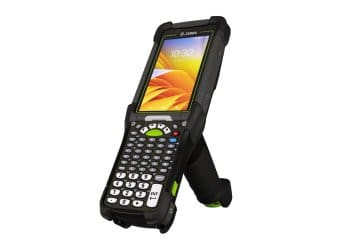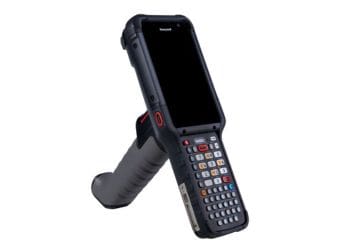When it comes to selecting mobile computing options for a demanding and unforgiving hazardous environment, your operation will require the most rugged and safe solutions. An intrinsically safe or non-incendive mobile computer with integrated barcode scanner protect your workers and assets in a hazardous area where there is risk of explosion.
CSSI Technologies works with the leading providers of explosion proof, non-incendive , intrinsically safe computers and tablets. We provide devices rated for each hazardous area zone: NEC Class I, Div 1 and Class I, Div 2 devices. Contact us for help specifying an appropriate IS handheld computer.
Hazardous environments require appropriate intrinsically safe devices
It is important to note that it can be extremely dangerous for mobile workers to use normal handheld computers, even those which are ruggedized, in a hazardous area if they have not been certified appropriately as non incendive or explosion proof.
What are non-incendive hazardous environments?
A hazardous location or ATEX zone is one in which there is a risk, or even a likelihood, of fire or explosion should an ignition source be introduced. Some examples would include refineries, operations where flammable gases or volatile flammable liquids are produced or utilized, and facilities with a high presence of dust or powder such as large bakeries or grain silos. In these hazardous atmospheres, any potential source of spark or ignition must be recognized and properly managed. This includes mobile computers such as handhelds, rugged laptops and barcode scanners, as well as electric devices such as wireless access points.

Relevant hazardous environments might contain:
- Combustible dust or powder
- Flammable gases or ignitable concentration of mists
- Ignitable fibers
- Vapors
There are 2 commonly seen systems for managing explosive atmospheres. In Europe, the ATEX directive is used, with areas of different risk divided into zones (ie. ATEX zone 21). In the US, NEC Hazardous Location standards are used. We will discuss key NEC standards further.
What do the hazardous location classes mean?
Class I hazardous locations refer to facilities with explosive gas, vapors, and liquids. There are two relevant ‘divisions’ within Class I to consider for explosion proof mobile computers:
Class I, Division 1
3 different situations could exist to require the class i div 1 rating:
- Ignitable concentrations of flammable vapors or explosive gas may be present in normal operating conditions
- Ignitable concentrations of flammable vapors or gases may exist frequently during repair/maintenance operations, or due to leakage
- Faulty operation of equipment or equipment breakdown might release ignitable concentrations of flammable gases, vapors, or ignitable fibers, and might cause failure of electric equipment
Class I, Division 2
One of the following must exist in order to require the class i div 2 rating:
- Volatile flammable liquids or flammable gases are handled, processed or used, but the hazardous liquids, vapors or gases will in normal operating conditions be confined within closed containers or closed systems from which they can escape only in the event of accidental rupture or breakdown of such containers or systems, or as a result of abnormal operation of equipment.
- Ignitable concentrations of gases or vapors or ignitable fibers are normally prevented by positive mechanical ventilation, and which might become hazardous through failure or abnormal operations of the ventilating equipment.
- Adjacent to a Class I, Division 1 location, and to which ignitable concentrations of gases or vapors might occasionally be communicated unless such communication is prevented by adequate positive-pressure ventilation from a source of clean air, and effective safeguards against ventilation failure are provided.
There are other Classes and parameters describing each hazardous environment. Contact your CSSI rep to explore further.
Intrinsically safe devices create a safer hazardous environment
Why you can’t use your regular rugged handheld devices
Typical rugged mobile devices and scanners may be able to stand up to heavy use and abuse, but that does not necessarily cover the device’s potential to cause ignition through electrostatic discharge or some other cause. It is necessary to selective devices which have been specially manufactured or modified so as to attain non incendive status.
Examples of intrinsically safe mobile computers
 | The Aegex 100M is a non-incendive rugged tablet PC rated for use in Class I, Div 1 and ATEX Zone 1 and Zone 0 hazardous environments. |
 | The Zebra Technologies MC9400 is an ultra-rugged Android mobile computer with configurations suitable for use in a Class I, Div 2 hazardous area. |
 | The Honeywell CK67 handheld computer is an Android device with configurations available for use in CID2 non-incendive / ATEX areas. |
CSSI can help you select and integrate the right intrinsically safe mobile devices
Why should you consult with CSSI? Our team of rugged mobile device experts will consult with you to determine your goals and requirements, and will specify an appropriate device from one of our rugged device partners. More than just selecting a handheld device or rugged tablet PC with intrinsic safety, we will support you with managed services: integrating the device into your business systems, configuring it for deployment, and managing its Android life cycle as patches and updates become available.
Other related services provided by CSSI include: site assessment , Wi-Fi survey and analysis (including intrinsically safe Wi-Fi hardware), custom programming , and mobile device management .
Seeking intrinsically safe or non-incendive computing devices? Contact CSSI today to discuss your project.
